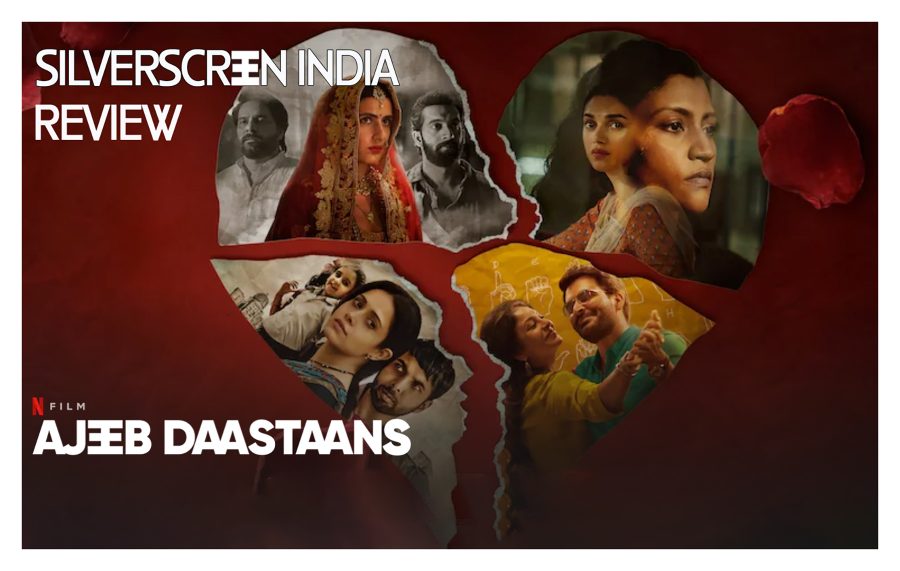In Ajeeb Daastaans, the new Netflix anthology, there is always an offspring. Shashank Khaitan, Raj Mehta, Neeraj Ghaywan and Kayoze Irani make up the directors’ roundtable. The four short films contain, in order – the idea of an offspring, a new offspring, an offspring as the Macguffin and marital fissures unfairly pinned on the offspring. By sheer coincidence or otherwise, this through line follows from one film to the next.
Khaitan’s Majnu, the weakest short, begins with a declaration of a royal heir to his new wife on their wedding night. Babloo (Jaideep Ahlawat) tells Lipakshi (Fatima Sana Shaikh) that he loved someone else, this is a marriage of convenience, a business deal and avows that there’ll never be an offspring to present to his father. It is tiring to learn that Khaitan is still chasing his love for the 90s films of Yashraj and Johars. Enter Raj (Armaan Ralhan), three years into the loveless, sexless and lifeless marriage of Babloo and Lipakshi. Raj is Hindi cinema’s only eternal Raj and Babloo is the Raavan figure with Lipakshi in his trap. Curiously, there is a Vibhishan too and no other woman in sight. But Khaitan likes to live in the past so much that a railway station figures in the end. Unfortunately, unlike any of the features he’s made, this short is more lifeless than Babloo and Lipakshi’s union.
Mehta’s Khilauna might be titled playfully but in sensibilities is the opposite of his debut Good Newwz while bordering on a similar subject. Meenal (Nushrratt Bharuccha) is a househelp who takes a voluntary transfer from one family – trying for a child without success – to another, wealthier one with a child on the way. All because the man of the latter house can get her home an electricity connection. Khilauna adheres to cliches, portraying Meenal as the hypersexualised working-class woman. She shares a love-hate relationship with Sushil (Abhishek Banerjee), the local ironing guy, hate reserved for day, love for the night. Khilauna plays with the contradictions of a divided society and how we are wired to think. In the process, it loses its own footing and decides everything in advance for us.
It might spell out some details but Ghaywan’s Geeli Puchhi is refreshingly complex in the distinctions it forces us and the characters to commit. It reminds one of Thiagarajan Kumararaja’s Super Deluxe, another film that nudged us to confront uncomfortable truths and navigate intersections. Geeli Puchhi lays out intersectionality like it is – the most confusing highway interchange. Bharti (Konkona Sen Sharma bringing the butch) is a “craftsman” among machine-men according to her Brahmin boss who recruits a woman from his caste – Aditi Rao Hydari’s Priya Sharma – for the data operator job that Bharti was eyeing. While Bharti is struggling to accept the punishment meted out to her for being Dalit, she is also the only woman for Priya to count as an ally in the all-male white and blue-collar combined workplace. Priya wonders where Bharti relieves herself. In a moment of exasperation Bharti asks, “Do you see any woman here?” When Priya says aap, Bharti discovers something they share, something that didn’t even cross her mind.
Ghaywan’s film is a minefield that gradually balloons in a closed space with sharp pins on all sides. A millimetre expansion here and it explodes. It is clever, pushing both Bharti and Priya into places where they need to reconcile with their respective truths. As their friendship evolves, they learn new things about one another that sets fire to considerations they had made for each other. When can one be an ally? As the privileged, your allyship comes with no caveats. What about the oppressed? Can you be an ally to someone suffering under one systemic institution while being a living evidence of another that is crushing you? How will social constructs crumble if one cannot question savarna feminism? The offspring as MacGuffin is a deliberate choice. Geeli Puchhi tells us that affirmative action isn’t enough, one must also indulge in assertive action.
Recommended
Irani’s Ankahi is reason to marvel at two gifted actors – Shefali Shah and Manav Kaul. Natasha (Shah) is married to Rohan and they have a daughter Samaira who needs a cochlear implant. Samaira’s disability has driven a wedge in their marriage as Rohan is more of a provider than a father. The film is predictable, but it is beautifully divided into the talkie, busy marriage and the silent, sign language-filled affair between Natasha and Kabir (Kaul), a hearing and speech impaired photographer. This is another film concerned with conflicting and ambiguous emotions. Samaira wonders if she will ever be loved when her father cannot muster any affection for Natasha, her senses all in order. Shah delivers an intricate performance that has everything packed within a tiny timeframe, a mother and wife cornered into disbelieving her own philosophy.
****
The Ajeeb Daastaans review is a Silverscreen original article. It was not paid for or commissioned by anyone associated with the film. Silverscreenindia.com and its writers do not have any commercial relationship with movies that are reviewed on the site.



